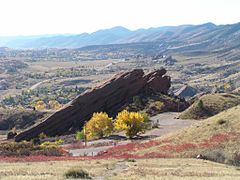Red Rocks Park
The red sandstone found throughout Red Rocks Park is geologically identified as belonging to the Fountain Formation. Other Colorado examples of Fountain Formation geology include nearby Roxborough State Park, Garden of the Gods near Colorado Springs, and the Flatirons near Boulder. The rocks were formed about 290-296 million years ago when the Ancestral Rocky Mountains were eroded during the Pennsylvanian epoch. Later, uplift during the Laramide orogeny tilted the rocks to the angle at which they sit today.
An Army expedition led by Stephen Long discovered present-day Red Rocks in 1820. The park was in times far past a favored campsite of the Ute tribe for it provided natural cover from the elements. Its earliest known name was the Garden of the Angels, reputedly given to it on July 4, 1870, by Martin Van Buren Luther, a pioneer Colorado judge. In 1872, Marion Burts became the first recorded owner of Red Rocks. He sold it to Leonard H. Eicholtz, a civil engineer who helped build the Union Pacific Railway and who developed the property into a park in 1878. Eicholtz added roads, trails, picnic grounds, steps, and ladders so visitors could explore the park. In 1906, Eicholtz sold Red Rocks to famed editor John Brisben Walker which he purchased with proceeds from his sale of Cosmopolitan magazine; Walker organized concerts on a temporary platform at the Garden of the Titans. Known however by the folk name of Red Rocks since the area was settled, it was formally given that name when Denver acquired it in 1928 from Walker.
Within the park boundaries is the Red Rocks Amphitheatre, a venue used since 1941. The Amphitheater was designed by Burnam Hoyt within the area between two massive slabs of Red stone (Ship Rock and Creation Rock).
Park construction
Denver Mayor Ben Stapleton resisted developing the already beautiful Red Rocks but the city used Depression-era New Deal funding and resources to build out the park, as part of the development of the Denver Mountain Parks system. City planner George Cranmer oversaw the development, securing federal funding and establishment of a Civilian Conservation Corps (CCC) camp at Mount Morrison to facilitate the construction of the park's features. CCC crews were responsible for building out the early roads and the amphitheater, as well as a Pueblo-style concession stand. The park along with surviving CCC camp (which is one of the best preserved of such camps) were designated a National Historic Landmark in 2015.
Trails
There are several short, pedestrian-only trails in the park: Funicular Trail, Geologic Overlook Trail, Mt. Vernon Creek Trail, Red Rocks Trail, and the Trading Post Trail. Other multi-use trails are open to mountain bikes, horses, and leashed dogs.
Gallery
-
Layered feature in Red Rocks Park, Colorado. Features in the Red Rocks region were caused by the uplift of mountains.
-
John Denver "Spirit" statue
-
Close-up of red rock
-
Sunburst on trail
-
Bridge in Red Rocks Park
-
Trading Post Trail sign
-
Red Rocks Park
-
Red Rocks Park in Denver
See also
- List of National Historic Landmarks in Colorado
- National Register of Historic Places listings in Jefferson County, Colorado
- Willowbrook Amphitheatre
- List of contemporary amphitheatres
- Live at Red Rocks (disambiguation)
- Roxborough State Park and its Archaeological District
References
- ^ "National Register Information System". National Register of Historic Places. National Park Service. March 15, 2006.
- ^ Dick Gibson. "Geology of Boulder Flatirons – The Fountain Formation".
- ^ Anon (January 23, 2017). "Red Rocks Park and Amphitheater". Colorado Encyclopedia. Colorado Encyclopedia. Retrieved June 12, 2020.
- ^ "NHL nomination for Red Rocks Park and Mount Morrison Civilian Conservation Corps Camp". National Park Service. Retrieved April 26, 2020.
- ^ Added July 21, 2015. See http://www.nps.gov/nhl/find/statelists/co/CO.pdf. For media coverage, see http://www.denverpost.com/golden/ci_28584880/red-rocks-conservation-corps-camp-named-national-historic; http://www.austin360.com/news/news/national/red-rocks-park-named-national-historic-landmark/nnDzY/; http://www.travelandleisure.com/articles/red-rocks-park-named-national-historic-landmark
- ^ "Red Rocks Hiking Trails [Hiking Near Denver, Colorado]". March 11, 2017.
- ^ "Red Rocks - Hiking". January 2016.
- ^ "Hiking Trails near Red Rocks".
- Klun, Kerry. "Historic Homes of Denver: Entertainment Series-Red Rocks." (n.d.): n. pag. 18 Feb. 2011. Web.







